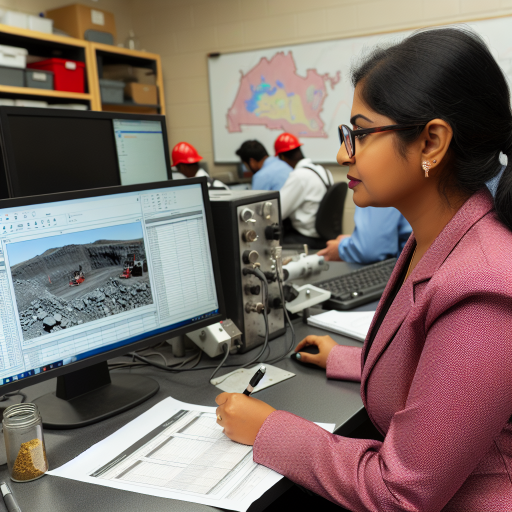Overview of Metallurgical Engineering as a Profession in Canada
Metallurgical engineering focuses on the study of metals and their properties.
Professionals in this field work with materials to improve their performance and durability.
They contribute significantly to industries such as aerospace, automotive, and energy.
In Canada, metallurgical engineering plays a crucial role in resource extraction and manufacturing.
Educational Pathways
A bachelor’s degree in metallurgical engineering is typically required for entry into the profession.
Many universities in Canada offer specialized programs in this field.
Students learn about materials science, thermodynamics, and process engineering.
Some programs include practical training through co-op placements and internships.
Key Responsibilities
Metallurgical engineers analyze material properties to determine their suitability for various applications.
They design experiments to test the characteristics of metals and alloys.
Moreover, they develop methods for processing and treating metals to enhance their performance.
Collaboration with other engineers and professionals is essential to design effective solutions.
Industry Demand and Opportunities
The demand for metallurgical engineers remains strong in Canada.
Industries seek professionals who can innovate and optimize material usage.
Career opportunities are available in mining, manufacturing, and research sectors.
Furthermore, metallurgical engineers can also pursue roles in quality assurance and project management.
Professional Development
Continuing education is vital for metallurgical engineers to stay updated with industry trends.
Organizations such as the Canadian Institute of Mining, Metallurgy and Petroleum offer resources.
Networking with professionals through conferences can enhance career growth.
Certification options are available to demonstrate expertise and commitment to the field.
Current Salary Trends for Metallurgical Engineers in Canada
Overview of Salary Ranges
The salary for metallurgical engineers varies across Canada.
On average, these professionals earn between CAD 70,000 and CAD 100,000 per year.
Factors influencing salary include experience, education, and location.
Impact of Experience on Salary
Experience plays a significant role in salary levels.
Entry-level metallurgical engineers typically start at around CAD 65,000.
Unlock Your Career Potential
Visualize a clear path to success with our tailored Career Consulting service. Personalized insights in just 1-3 days.
Get StartedWith five years of experience, salaries can increase significantly, exceeding CAD 85,000.
Senior engineers with over ten years may earn over CAD 120,000 annually.
Regional Variations in Salaries
Region significantly impacts earnings for metallurgical engineers.
For instance, those in Alberta and British Columbia often earn more.
In contrast, salaries in smaller provinces tend to be lower.
Additionally, cities like Calgary and Vancouver offer more opportunities and higher pay.
Industry Influence on Salaries
The industry in which an engineer works also affects salary levels.
Metallurgical engineers in mining or aerospace often receive higher compensation.
Conversely, those in government roles may earn less than their private-sector counterparts.
Furthermore, companies specializing in high-value materials offer better salaries.
Trends in Benefits and Bonuses
Beyond base salaries, many companies provide benefits and bonuses.
Annual bonuses can range from 5% to 15% of a salary.
Additionally, some companies offer professional development opportunities.
Health benefits and retirement plans are also common in this field.
Future Salary Expectations
The salary outlook for metallurgical engineers in Canada appears positive.
With rising demand for sustainable materials, job openings are projected to grow.
As the industry evolves, salaries may continue to rise.
Metallurgical engineering remains a lucrative field.
Comparison of Salaries by Region
Major Cities
Metallurgical engineers in major Canadian cities enjoy higher salaries.
Cities like Toronto and Vancouver lead with competitive pay rates.
They often offer salaries reflecting the high cost of living.
In Ottawa, for instance, salaries hover around $85,000 annually.
Salary ranges in major cities can vary significantly.
Some engineers earn upwards of $100,000 depending on experience.
Furthermore, large companies drive higher salary averages.
An example is Molybdenum Mining Corp., which pays top dollar.
Rural Areas
In contrast, rural areas present lower salary figures.
Locations such as Sudbury and Timmins offer more modest compensation.
Typically, salaries in these regions fall below $75,000 annually.
However, the cost of living is significantly lower in rural regions.
Some engineers value the work-life balance in these areas.
Additionally, opportunities for advancement can develop over time.
A small firm might provide unique experiences not found in cities.
For instance, Riverside Mining Ltd. offers hands-on roles.
Overall Comparison
The difference in salaries between urban and rural areas is notable.
Some engineers prefer city life for the higher pay.
Others appreciate the tranquility of rural living.
Ultimately, personal preferences affect salary choices.
Evaluating job satisfaction is as important as salary.
Career progression potential also plays a crucial role.
Engineers should consider all factors when choosing their location.
See Related Content: Biomedical Engineer Roles in the Healthcare Industry
Influence of Education Level on Metallurgical Engineering Salaries
Overview of Educational Requirements
Metallurgical engineering careers require specific educational qualifications.
Most positions require at least a bachelor’s degree in metallurgy or related fields.
Some roles may demand advanced degrees for higher responsibilities.
A master’s degree can enhance expertise and job prospects significantly.
Impact of Degree Level on Salary
Salary levels correlate strongly with degree attainment.
Bachelor’s degree holders earn competitive starting salaries.
Typically, they can expect initial annual salaries around $60,000 to $75,000.
Those with a master’s degree often see salaries increase significantly.
Master’s degree holders can earn upwards of $80,000 to $100,000 annually.
Additional Certifications and Training
Certifications can further enhance prospects and pay potential.
Industry-recognized credentials demonstrate specialized knowledge.
Such certifications contribute to salary boosts for metallurgical engineers.
Continuing education keeps professionals competitive in the field.
Influence of Industry on Salaries
The industry of employment impacts metallurgical engineering salaries.
Engineers in mining and mineral processing tend to earn more.
Research and development roles also provide competitive pay structures.
Therefore, choosing the right industry can maximize earning potential.
Experience Matters
Work experience is a significant factor influencing salary levels.
Entry-level engineers start lower on the salary scale.
With experience, salaries progressively increase.
Senior engineers can earn well into the six figures.
Continuous skill development is crucial for advancing careers.
Uncover the Details: Top Universities for Aerospace Engineering Studies
Impact of Industry Sector on Salary Variations in Metallurgical Engineering
Overview of Salary Variations
The salary of metallurgical engineers varies widely across different industry sectors.
This variation significantly affects overall earnings and career growth opportunities.
Several factors influence these salary differences, including demand, location, and experience.
Mining and Metals Sector
The mining and metals sector is one of the highest-paying areas for metallurgical engineers.
In this industry, engineers often work with extraction and processing technologies.
Companies focus on maximizing resource efficiency and minimizing environmental impact.
Due to high demand for skilled professionals, salaries here can exceed industry averages.
Aerospace and Defense Sector
The aerospace and defense sector also offers competitive salaries for metallurgical engineers.
This sector prioritizes quality control and material performance.
Engineers specialize in developing materials that withstand extreme conditions.
The specialized skills in this field justify higher salary scales.
Automotive Industry
The automotive industry presents another lucrative option for metallurgical engineers.
Engineers in this sector focus on material selection and production processes.
As the industry shifts towards electric vehicles, new opportunities arise.
This transition may lead to increased demand for skilled professionals, affecting salary levels.
Research and Development
Research and development positions typically offer varied salary packages.
Engineers engage in innovative projects and explore new materials and processes.
The salaries can differ based on company funding and project scope.
However, successful outcomes in R&D often lead to significant salary increases.
Academic and Training Roles
Metallurgical engineers who pursue academic careers generally earn lower salaries.
However, these positions often come with significant benefits, including job stability.
Instructors and researchers contribute to the field by educating future engineers.
Passion for teaching can outweigh salary considerations for many professionals.
Industry Influence on Career Planning
Engineers must consider their preferred sector when planning their careers.
A deep understanding of these factors can aid in making informed career choices.
Gain More Insights: Professional Associations for Metallurgical Engineers

Career Advancement Opportunities and Their Effect on Salary Growth
Understanding Career Pathways
Career advancement in metallurgical engineering comes with various pathways.
Many engineers start as junior metallurgists after graduation.
With experience, they can progress to senior roles or managerial positions.
Furthermore, specialization in areas such as materials science enhances career prospects.
Impact of Further Education
Pursuing advanced degrees significantly impacts salary growth.
Many employers offer higher salaries for master’s or doctoral degrees.
In addition, certifications in specific technologies can boost earning potential.
Continuous learning demonstrates commitment and enhances skills.
Networking and Professional Organizations
Building a strong professional network can facilitate career advancement.
Professional organizations, like the Canadian Institute of Mining, Metallurgy and Petroleum, offer resources.
Attending industry conferences provides networking opportunities.
Moreover, these connections can lead to mentorship and job opportunities.
Geographic Influence on Salary
Location plays a significant role in salary potential.
Metallurgical engineers in urban areas often earn higher salaries.
For instance, cities like Toronto and Vancouver offer more job opportunities.
Remote areas may provide unique opportunities with varying salary scales.
Company Size and Industry Sector
The size of a company influences salary and advancement opportunities.
Large corporations often provide clearer advancement paths and benefits.
On the other hand, small firms may offer faster growth and wider roles.
Additionally, sectors such as aerospace and automotive tend to pay higher salaries.
The Role of Experience
Experience fundamentally shapes salary growth in metallurgical engineering.
Entry-level positions usually have lower starting salaries.
As professionals gain experience, their earning potential increases significantly.
Moreover, experienced engineers can also take on leadership roles.
Explore Further: Collaboration Between Metallurgical Engineers and Other Fields
Role of Certifications and Additional Qualifications in Salary Enhancement
Importance of Certifications
Certifications significantly influence salary prospects in metallurgical engineering.
They showcase specialized skills and knowledge to potential employers.
Professional certifications enhance credibility and marketability.
Furthermore, they can open doors to higher-level positions.
Many companies prioritize candidates with relevant certifications during hiring.
Types of Relevant Certifications
Various certifications are available for metallurgical engineers in Canada.
- The Certified Metallurgical Engineer (CME) designation holds considerable value.
- The Associate of the Canadian Institute of Mining, Metallurgy and Petroleum (ACM) certification is also respected.
- Additionally, the Six Sigma certification benefits those in quality management roles.
Impact of Advanced Degrees
Advanced degrees often enhance earning potential as well.
Graduate degrees signal a deeper understanding of the field.
Many organizations prefer candidates with master’s degrees for senior positions.
Furthermore, advanced education can lead to research opportunities and innovation roles.
Continuous Professional Development
Continuous professional development (CPD) plays a critical role in career advancement.
Attending workshops and conferences helps professionals stay updated on industry trends.
This ongoing learning often leads to salary increases and promotions.
Employers value engineers who seek to enhance their skill sets consistently.
Networking Opportunities
Certifications and additional qualifications provide valuable networking prospects.
Engaging in professional organizations expands professional connections.
These connections can lead to better job opportunities and mentorship.
Ultimately, a robust professional network can influence salary negotiations.
Future Salary Predictions and Job Market Trends for Metallurgical Engineers
Current Salary Overview
The salary for metallurgical engineers in Canada varies significantly.
This variation is influenced by factors such as experience, education, and location.
On average, professionals in this field earn between CAD 70,000 to CAD 100,000 per year.
Higher salaries often align with roles in research and management positions.
Market Demand Insights
Job opportunities for metallurgical engineers are expected to rise in Canada.
The growing demand for sustainable materials drives this increase.
Additionally, innovations in the mining and materials industries create job prospects.
Companies seek engineers with expertise in advanced materials and processes.
Salary Predictions for the Coming Years
Experts predict that salaries for metallurgical engineers will continue to rise.
This growth aligns with the demand for skilled workers in the industry.
Furthermore, engineers with specialized skills may see increases well above average rates.
Regional Salary Variations
Salaries also differ based on location within Canada.
Metallurgical engineers in major urban centers tend to earn more.
For example, positions in Toronto or Vancouver often offer higher compensation.
In contrast, smaller cities may have lower salary scales.
Impact of Education and Certifications
Education level significantly impacts salary potential for metallurgical engineers.
Those with advanced degrees or certifications often earn more.
Additionally, relevant certifications can enhance job prospects and salary offers.
Job Market Trends
The metallurgical engineering job market is evolving rapidly.
Emerging technologies are reshaping the landscape of opportunities.
Engineers skilled in digital technologies are in high demand.
Companies are increasingly looking for talent that can integrate technology with engineering practices.
Additional Resources
How much do Materials Science and Engineering Industry Jobs pay …




